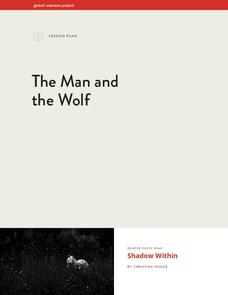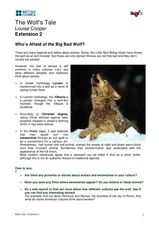K20 LEARN
Ecosystems, Human Activity, And Interactions, Oh My!: Human/Environment Interaction
Word clouds about ecosystems hook learners into a lesson that explores Yellowstone wildlife. Young scientists create cause-and-effect relationships after examining data and recommend solutions to their observed problems. More data...
Serendip
Food Webs, Energy Flow, Carbon Cycle, and Trophic Pyramids
The reintroduction of a species to an area doesn't always go as expected. Scholars learn about the reintroduction of wolves into Yellowstone National Park with a video, reading, and discussion questions. They complete a hands-on activity...
WolfQuest
The Return of Gray Wolves to Yellowstone National Park: Right or Wrong?
Should gray wolves be removed from Yellowstone National Park? After researching the complex relationships between the various habitats and species at Yellowstone National Park, including humans, class members take a position on the...
K5 Learning
Will the Wolf
How well can a wolf survive without a pack? Third graders read about headstrong Will and his desire to be an independent wolf with a short story and series of comprehension questions.
Global Oneness Project
The Man and the Wolf
Human attitudes toward the big bad wolf come into focus in a photo essay that asks viewers to consider their own feelings about the endangered species.
Curated OER
Wolves: Friend or Foe?
Students study wolves and their habitat in Yellowstone. For this environment and behavior lesson students create an interactive map of wolves in Yellowstone.
Curated OER
From Wolf to Dog
Students explain how dogs evolved from wolves based on the video. In this biology lesson, students research about breeding animals for specific traits. They interview dog owners and create a presentation about the dog.
Curated OER
Who's Afraid of the Big, Bad Wolf?
Students compare wolves' behaviors to those of the human race. In this wolf lesson students write a story that will show that wolves are either good or evil.
Curated OER
Wolves At Our Door
Young scholars investigate the wolf. In this animal adaptation lesson, students examine the social characteristics of the wolf. They discuss the role of human intervention in reestablishing the wolf population.
Curated OER
Wolves
Students explore wolves. For this ecology and wolves lesson, students research predator-prey relationships on the Internet and complete a related worksheet with a partner. Students interpret data on bar graphs to determine growth and...
Curated OER
Shaun Ellis: Leader of the (Wolf) Pack
Students react to a statement about living with wolves, then read a news article about Shaun Ellis and his time living with wolves. In this current events and wolves lesson, the teacher introduces the article with a discussion and a...
Curated OER
Wolves and Penguins
Students practice subtraction strategies and the use of number lines to count back. They use photographs of wolves and penguins to practice subtraction and the creation of number lines. Afterwards, they draw a wolf howling or a penguin...
Curated OER
Wolf Fact Cards
Students write a non-chronological report about wolves. They read and discuss wolf fact cards in small groups, complete a KWL chart, observe the teacher model the steps of writing a report, and conduct research and write an original...
Curated OER
The Wolf's Tale
In this ESL literature worksheet, students read excerpts from a story told from the wolf's perspective in Little Red Riding Hood. Students complete 4 pages of exercises and essay questions about this story.
Curated OER
The Wolf's Tale: Louise Cooper: Extension 2
In this wolves worksheet, students complete 3 pages of extension activities pertaining to wolves, their endangered status, and fear of wolves in history and literature. This is intended to be an extension after reading The Wolf's Tale by...
Curated OER
Let's Roam Together
Pupils collect information about buffalo and transform their classroom into a wildlife park. In this conservation lesson, students work in groups to research a question pertaining to buffalo populations and habitat requirements. They...
Curated OER
Wolf Communications Matching Activity
Students complete several activities to learn about wolves. In this wolf science lesson, students read and complete activities to learn about wolf communication, their life cycle, fun facts, and hunting activities. Students also read...
Curated OER
Coloring Page - Wolf
In this coloring worksheet, students color a wolf. Students may write a story or discuss why the wolf is howling. Older students may use the picture as an illustration to a story. Students may use this a flashcard to identify animals.
Curated OER
Look to the North: A Wolf Pup Diary
Students explore the book, Look To The North: A Wolf Pup Diary. They find five facts about wolves and discuss with their groups. Students explore the timeline of a wolf pup and create a food chain for three of the animals found in the book.
Curated OER
Lone Wolves
Students examine the reasons why some people do not support the protection of the wolf on the Endangered Species list. After reading an article, they discuss the controversy of delisting the wolves. As a class, they debate this issue...
Curated OER
North American Animals
Pupils are introduced to the anatomy and characteristics of the North American wolf, grizzly bear and bobcat through a purchased kit. They cast plaster models of each of the animals for study and display.
Curated OER
Wolves
Students utilize several different sources to research wolves, after completing the K-W-L process.
Curated OER
What Does a Wolf Eat?
In this science worksheet, students examine 12 pictures. Directions on the page tell students to circle all the items that a wolf in the wild might eat. No information about wolves is provided.
Curated OER
The Cry Of The Wolf
Students inverstigate the history of wolves and how they have changed throughout the ages. The movement to eradicate the wolves is studied and students are asked to explain their opinion of it. This is given after spending the time to...

























